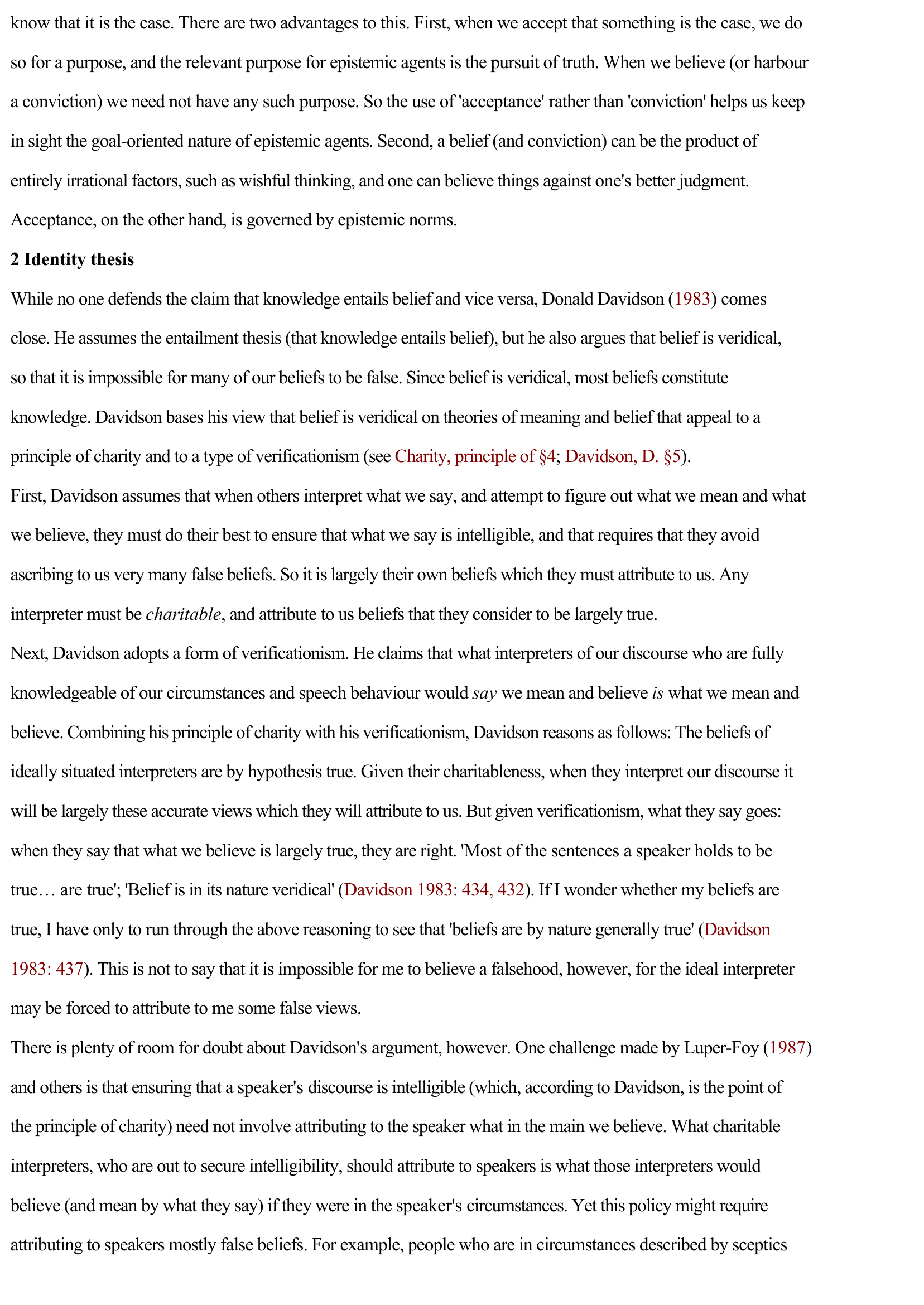Belief and knowledge
Publié le 22/02/2012
Extrait du document
«
know that it is the case.
There are two advantages to this.
First, when we accept that something is the case, we do
so for a purpose, and the relevant purpose for epistemic agents is the pursuit of truth.
When we believe (or harbour
a conviction) we need not have any such purpose.
So the use of 'acceptance' rather than 'conviction' helps us keep
in sight the goal-oriented nature of epistemic agents.
Second, a belief (and conviction) can be the product of
entirely irrational factors, such as wishful thinking, and one can believe things against one's better judgment.
Acceptance, on the other hand, is governed by epistemic norms.
2 Identity thesis
While no one defends the claim that knowledge entails belief and vice versa, Donald Davidson ( 1983 ) comes
close.
He assumes the entailment thesis (that knowledge entails belief), but he also argues that belief is veridical,
so that it is impossible for many of our beliefs to be false.
Since belief is veridical, most beliefs constitute
knowledge.
Davidson bases his view that belief is veridical on theories of meaning and belief that appeal to a
principle of charity and to a type of verificationism (see Charity, principle of §4 ; Davidson, D.
§5 ).
First, Davidson assumes that when others interpret what we say, and attempt to figure out what we mean and what
we believe, they must do their best to ensure that what we say is intelligible, and that requires that they avoid
ascribing to us very many false beliefs.
So it is largely their own beliefs which they must attribute to us.
Any
interpreter must be charitable , and attribute to us beliefs that they consider to be largely true.
Next, Davidson adopts a form of verificationism.
He claims that what interpreters of our discourse who are fully
knowledgeable of our circumstances and speech behaviour would say we mean and believe is what we mean and
believe.
Combining his principle of charity with his verificationism, Davidson reasons as follows: The beliefs of
ideally situated interpreters are by hypothesis true.
Given their charitableness, when they interpret our discourse it
will be largely these accurate views which they will attribute to us.
But given verificationism, what they say goes:
when they say that what we believe is largely true, they are right.
'Most of the sentences a speaker holds to be
true… are true'; 'Belief is in its nature veridical' (Davidson 1983: 434, 432 ).
If I wonder whether my beliefs are
true, I have only to run through the above reasoning to see that 'beliefs are by nature generally true' (Davidson
1983: 437 ).
This is not to say that it is impossible for me to believe a falsehood, however, for the ideal interpreter
may be forced to attribute to me some false views.
There is plenty of room for doubt about Davidson 's argument, however.
One challenge made by Luper-Foy ( 1987 )
and others is that ensuring that a speaker's discourse is intelligible (which, according to Davidson, is the point of
the principle of charity) need not involve attributing to the speaker what in the main we believe.
What charitable
interpreters, who are out to secure intelligibility, should attribute to speakers is what those interpreters would
believe (and mean by what they say) if they were in the speaker's circumstances.
Yet this policy might require
attributing to speakers mostly false beliefs.
For example, people who are in circumstances described by sceptics.
»
↓↓↓ APERÇU DU DOCUMENT ↓↓↓
Liens utiles
- CONNAISSANCE ET RÉALITÉ, Knowledge and Reality, 1885. Bernard Bosanquet
- Ideology and Rationality in the History of the Life Sciences
- Relationship between religion, spirituality, and young Lebanese university students’ well-being.
- Course of reading and writing for 1st year English Licence
- dance and the different types of choreographie process

































